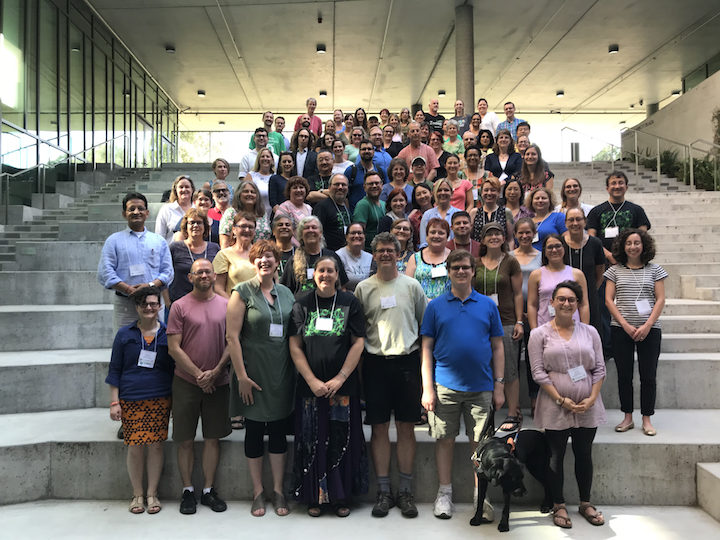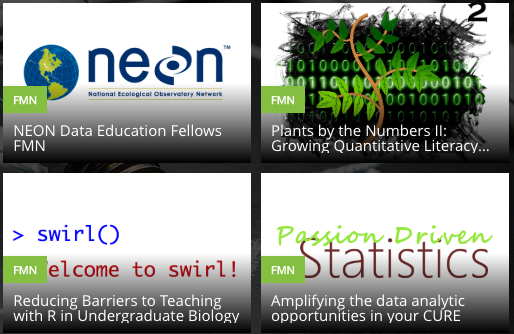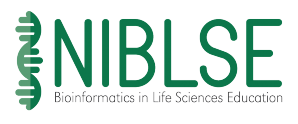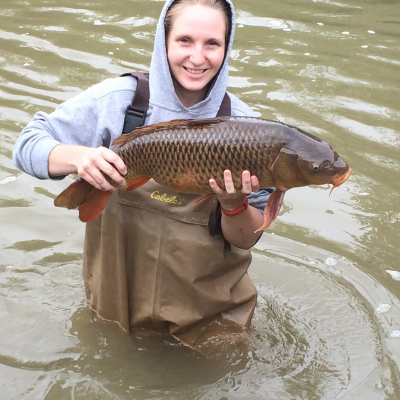|

Visit the 2018 BioQUEST / QUBES "Wicked Problems" Workshop Page

Fall FMNs
There is still time to apply to 3 of the QUBES Faculty Mentoring Networks starting this fall
The Quantitative Undergraduate Biology Education and Synthesis (QUBES) project offers an online platform to facilitate faculty professional development and sharing open educational resources for teaching quantitative skills. We offer professional development opportunities called Faculty Mentoring Networks (FMNs). There is still time to apply for one of the FMNs listed below. For a complete list of FMNs running this fall, visit the QUBES FMN page.
- Building mathematical intuition with online MathBench biology modules
- Amplifying the data analytic opportunities in your CURE
- Plants by the Numbers II: Growing Quantitative Literacy Using Botany
Read more about each FMN below.
Building mathematical intuition with online MathBench biology modules
Have you tried using online modules with mixed success? Or are you thinking about using online modules but wondering how best to incorporate them into your course? Apply now to join us for the Fall 2018 QUBES Faculty Mentoring Network (FMN): Building mathematical intuition with online MathBench biology modules. Participants in this FMN will focus on how to integrate MathBench Biology Modules (mathbench.umd.edu) into undergraduate life sciences or mathematics courses. MathBench introduces and reinforces mathematical material in a way that is hands-on, accessible, and intuitive. Accepted applicants will adapt and implement MathBench modules in their courses. Faculty will participate in biweekly online sessions to collaborate with and learn from others in the network and receive mentoring from implementation experts. Based on their experiences, participants will create implementation guides and instructor resources that will be posted on QUBESHub as open educational resource publications.
More information here...
Applications are due by Aug. 17, 2018. Apply here.
Amplifying the data analytic opportunities in your CURE
Are you interested in incorporating full data analysis projects into your classes? Do you have a CURE data set you need support analyzing and interpreting? Apply now to join us for the fall 2018 Passion-Driven Statistics/QUBES Faculty Mentoring Network (FMN). Participants in this FMN will plan and conduct quantitative analyses using large data sets and research questions of their choosing. Accepted applicants will create an educational module for their unique biology topic. While doing this, they will participate in weekly virtual sessions, receive support for conducting analyses on their chosen platform (i.e. SAS, R, Stata, Python or SPSS) and collaborate with others in the network. Early career participants are especially encouraged to apply. Lead by Faculty Mentor: Lisa Dierker, Wesleyan University
More information here...
Applications are due by August 30, 2018. Apply here.
Plants by the Numbers II: Growing Quantitative Literacy Using Botany
Are you interested in adopting plant-focused modules that address quantitative reasoning skills? Apply now to join us for the Fall 2018 BSA/QUBES Faculty Mentoring Network (FMN). Participants in this FMN will focus on how to use data-driven modules in undergraduate biology courses. Accepted applicants will customize and implement newly designed educational modules from a wide range of botanical topics. While doing this, they will participate in biweekly virtual sessions to collaborate with and support others in the network and receive mentoring.
More information here... Attend our informational webinar! August 13, 2018 at 10:00-11:00 am EST Applications are due August 17, 2018. Apply here.

Math Modeling Hub is open for beta testing
The Math Modeling Hub (MMHub) is an online community and resource repository for the teaching and learning of mathematical modeling at all grade levels. It is being collaboratively organized by COMAP, NCTM, and SIAM - three substantial mathematics professional societies with interests in modeling education. MMHub recently launched its beta testing phase and is actively seeking users and feedback around their modeling teaching materials.
There are many potential ways to contribute to the development of this community including:
- Visit the Forums page and introduce yourself, peruse the existing discussions, or add your own question or comment.
- Use the Projects environment as a "sandbox" to develop modeling resources and share ideas.
- Browse the Resources page to find materials that would be helpful in your own teaching. Of course, we are just getting started with this, so the size of our collection is currently quite modest, but you can help by...
- Share resources that you have developed. We are interested in growing our collection of projects and instructional materials at all grade levels, so if you have something you have developed--even if you feel it's "nothing special"--please consider sharing it.
- You can also volunteer to serve on the MMHub Editorial Board. We are looking for people across the entire K-16 spectrum to review (and in some cases "try out") materials that are being published as MMHub resources.
The Math Modeling Hub is--and always will be--a work in progress. If you have questions, suggestions, or feedback for the MMHub Steering Committee, feel free to contact Jason Douma [jason.douma at usiouxfalls.edu] the MMHub Managing Director.

NISLES is recruiting new members to recommend and revise bioinformatics education materials
QUBES in the News
 
QUBES Near You
|